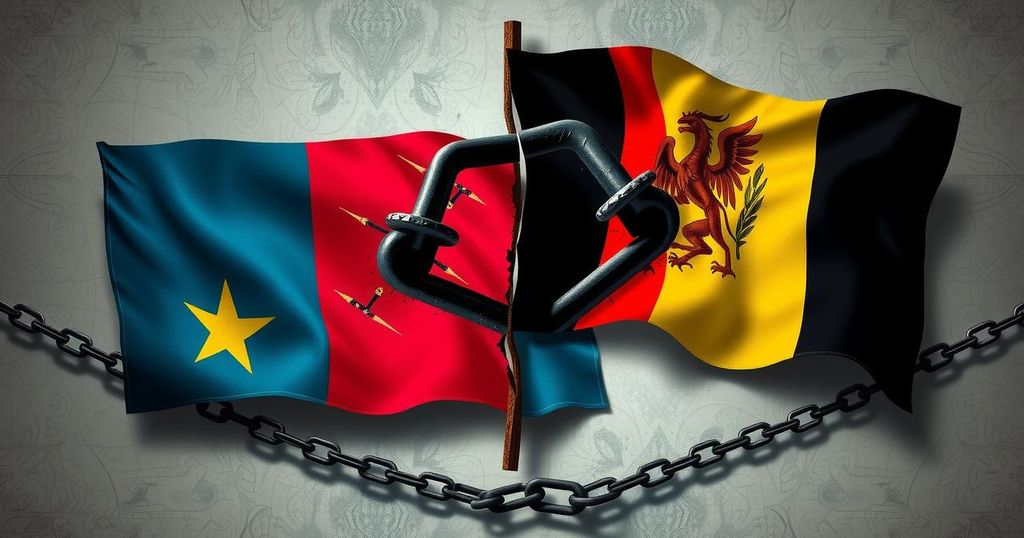Global news
AFRICA, ANGOLA, BELGIUM, BRUSSELS, BUKAVU, CONGO (KINSHASA), DEMOCRATIC REPUBLIC OF CONGO, DRC, EU, EUROPE, EUROPEAN UNION, GOMA, INTERNATIONAL RELATIONS, MAXIM, MAXIME PRÉVOT, MILITARY COUP, NORTH AMERICA, PRÉVOT, PREVOT, REGIONAL COOPERATION, RWANDA, RWANDA DEFENSE, RWANDA DEFENSE FORCE, RWANDA DEFENSE FORCES, UNITED STATES, WEST AFRICA
Fatima Khan
0 Comments
Rwanda and Belgium Cut Diplomatic Ties as EU Sanctions Target Military Leaders
Rwanda and Belgium have severed diplomatic ties as the EU imposes sanctions on Rwandan military leaders amid escalating tensions linked to Rwandan-backed M23 rebels in the DRC. The EU’s actions come prior to peace talks, highlighting the conflict’s humanitarian impact and the complex relationship between the involved nations.
On March 17, 2025, Rwanda and Belgium formally severed diplomatic relations amid escalating tensions surrounding Rwandan-backed M23 rebels’ aggressive incursions into the Democratic Republic of Congo (DRC). This conflict has led to significant territorial gains for the rebels, who have captured resource-rich cities such as Goma and Bukavu, resulting in a humanitarian crisis with reported casualties exceeding 7,000 lives, according to the DRC government.
The European Union’s decision to sanction Rwanda comes in the wake of a foreign affairs ministers meeting in Brussels. The sanctions target senior officials within the Rwanda Defense Force and the M23 group, as well as a refinery implicated in the illegal exploitation of DRC’s natural resources. These measures precede upcoming peace discussions scheduled to take place in Angola.
An EU diplomat clarified that the sanctions are not intended to vilify Rwanda but rather to hold accountable those infringing upon international humanitarian law. In response to Belgium’s support for the DRC, Rwanda’s Foreign Affairs Ministry demanded the departure of Belgian diplomats and accused Belgium of systematically undermining Rwanda through misinformation and manipulation.
Belgian Foreign Affairs Minister Maxime Prévot labeled Rwanda’s response as disproportionate, asserting that it reflects a refusal to engage constructively in dialogue. Meanwhile, EU ministers denounced the military presence of Rwandan forces in the DRC, denoting it as a severe breach of the country’s sovereignty and accused some EU actions of indirectly exacerbating the conflict. Critics have suggested that a critical minerals agreement with Rwanda provides cover for the smuggling of illicit resources from DRC.
While the sanctions represent initial measures, an EU representative indicated that further action may be required. The EU is in the process of reviewing agreements related to critical raw materials to determine the necessity of further restrictions. Notably, Rwanda had already suspended its bilateral cooperation with Belgium earlier in February, citing Belgium’s attempts to obstruct its access to development funding.
The diplomatic fracture between Rwanda and Belgium underscores the complexities of international relations in the context of regional conflicts and resource exploitation. The EU’s sanctions impose accountability on Rwandan military actions in the DRC but also reveal the intricacies of collaboration and discord among member states regarding conflict resolution and humanitarian law. The situation remains fluid, with potential repercussions for both nations and the broader geopolitical landscape.
Original Source: www.politico.eu




Post Comment